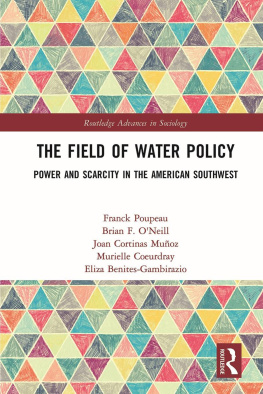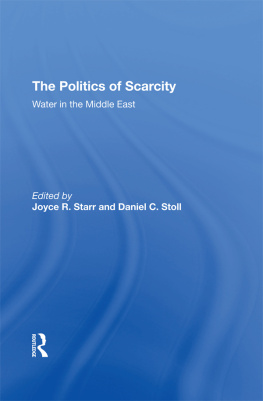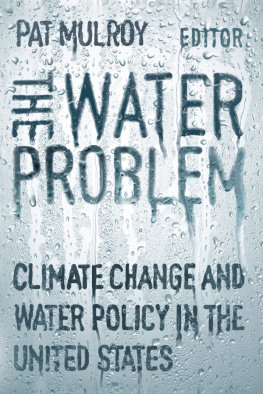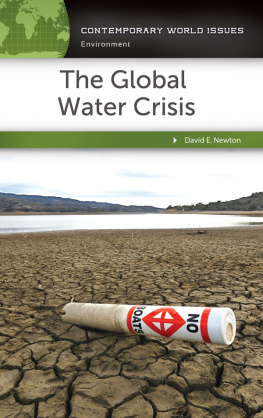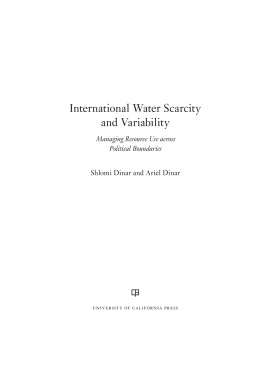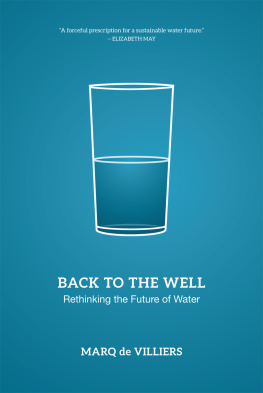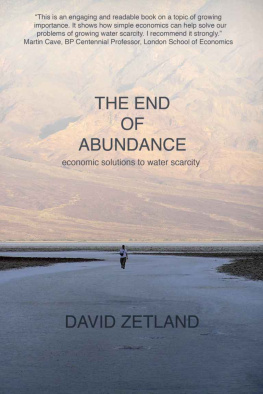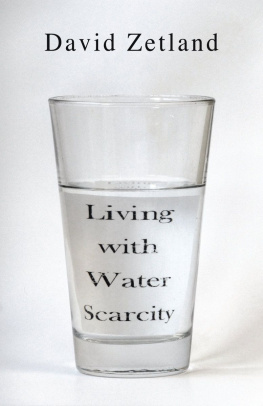The Global Water Crisis
Recent Titles in the
Contemporary World Issues
Series
Wind Energy: A Reference Handbook
David E. Newton
Profiling and Criminal Justice in America: A Reference Handbook, second edition
Jeff Bumgarner
Fracking: A Reference Handbook
David E. Newton
Cyber Warfare: A Reference Handbook
Paul J. Springer
Healthcare Reform in America: A Reference Handbook, second edition
Jennie Jacobs Kronenfeld and Michael Kronenfeld
Cloning: A Reference Handbook
David E. Newton
Hate Crimes: A Reference Handbook, third edition
Donald Altschiller
Illegal Immigration: A Reference Handbook, second edition
Michael C. LeMay
Obesity: A Reference Handbook, second edition
Judith S. Stern and Alexandra Kazaks
Solar Energy: A Reference Handbook
David E. Newton
Prescription Drug Abuse: A Reference Handbook
David E. Newton
The Minimum Wage: A Reference Handbook
Oren M. Levin-Waldman
Juvenile Justice: A Reference Handbook, second edition
Donald J. Shoemaker and Timothy W. Wolfe
Books in the Contemporary World Issues series address vital issues in todays society such as genetic engineering, pollution, and biodiversity. Written by professional writers, scholars, and nonacademic experts, these books are authoritative, clearly written, up-to-date, and objective. They provide a good starting point for research by high school and college students, scholars, and general readers as well as by legislators, businesspeople, activists, and others.
Each book, carefully organized and easy to use, contains an overview of the subject, a detailed chronology, biographical sketches, facts and data and/or documents and other primary source material, a forum of authoritative perspective essays, annotated lists of print and nonprint resources, and an index.
Readers of books in the Contemporary World Issues series will find the information they need in order to have a better understanding of the social, political, environmental, and economic issues facing the world today.
CONTEMPORARY WORLD ISSUES
The Global Water Crisis
A REFERENCE HANDBOOK
David E. Newton

Copyright 2016 by ABC-CLIO, LLC
All rights reserved. No part of this publication may be reproduced, stored in a retrieval system, or transmitted, in any form or by any means, electronic, mechanical, photocopying, recording, or otherwise, except for the inclusion of brief quotations in a review, without prior permission in writing from the publisher.
Library of Congress Cataloging-in-Publication Data
Names: Newton, David E., author.
Title: The global water crisis : a reference handbook / David E. Newton.
Description: Santa Barbara, California : ABC-CLIO, 2016. | Series: Contemporary world issues | Includes bibliographical references and index.
Identifiers: LCCN 2015051083 | ISBN 9781440839801 (alk. paper) | ISBN 9781440839818 (ebook)
Subjects: LCSH: Water-supplyEncyclopedias. | Water resources developmentEncyclopedias. | DroughtsEncyclopedias.
Classification: LCC TD348 .N49 2016 | DDC 333.91dc23
LC record available at http://lccn.loc.gov/2015051083
ISBN: 978-1-4408-3980-1
EISBN: 978-1-4408-3981-8
201918171612345
This book is also available as an eBook.
ABC-CLIO
An Imprint of ABC-CLIO, LLC
ABC-CLIO, LLC
130 Cremona Drive, P.O. Box 1911
Santa Barbara, California 931161911
www.abc-clio.com
This book is printed on acid-free paper 
Manufactured in the United States of America
Contents
A close observer of the worlds condition today might be excused for being overwhelmed by a host of seemingly insolubleor at least enormously challengingproblems and issues ranging from endless conflict in the Middle East and other parts of the world to global poverty and hunger to debates over the amounts and types of energy that humans need to survive and improve their lives to a variety of devastating diseases and medical conditions to the growing threat of global climate change to the mass movement of migrants and refugees in a variety of regions. Under such circumstances, it might be understandable that the observer would ignore a crisis affecting one of the simplest and most fundamental of all substances on the planet: water.
Yet, evidence begins to accumulate that humans are already facing a number of daunting challenges related to water scarcity and water stress, the lack to one degree or another of adequate supplies of clean water to meet even the simplest everyday domestic, agricultural, industrial, and other needs we face every day. Hardly a day goes by without new stories of water shortages in California or other parts of the American West, in the Middle East, in sub-Saharan Africa, and in southern Asia or reports of communities and nations facing the growing challenge of obtaining and delivering adequate quantities of safe water to their inhabitants.
Those individuals who live in developed nations may be somewhat surprised by growing concerns about a global water crisis. Yet, such a crisis is hardly a new phenomenon in human history. Droughts are, perhaps, the most dramatic example of conditions in which the very survival of individual humans and human communities is threatened, and droughts have been around as long as human history has existed. Disputes over water are also as old as the human race, with written stories ranging back more than 5,000 years to fights between nations over the use of water resources. Even today, many people who live in developed nations might be shocked to learn how many of their peers in developing nations may face a daily struggle to find enough clean water with which to wash, cook their meals, and clean themselves. Global water issues may seem like a new and strange problem to some of the worlds more prosperous communities, but it is a fact of life in billions of homes around the world today.
A number of factors are responsible for this problem, including a growing global population, increasing urbanization of most parts of the globe, competition among growing agricultural and industrial operations along with domestic needs, and, perhaps most important of all, increasingly obvious global climate changes. In addition to problems of quantityobtaining adequate amounts of waterthere are growing problems of qualitylack of access for hundreds of millions, if not billions, of people to adequate amounts of water to follow safe and sanitary handwashing and other disease-preventative practices.
Many national, regional, and international organizations, along with a host of general and special-interest nongovernmental organizations, are now launching vigorous campaigns to educate people about problems of water scarcity and WASH (water, sanitation, and hygiene) in almost every part of the world. These organizations are also creating and putting into practice a variety of active programs designed to solve problems of water shortages and lack of adequate WASH facilities and practice. Some progress has been made over the past two decades as a result of these programs, but far more needs to be done to ensure that the worlds population will have access to safe water for all human needs.

![David E Newton] The global water crisis : a reference handbook](/uploads/posts/book/104432/thumbs/david-e-newton-the-global-water-crisis-a.jpg)
